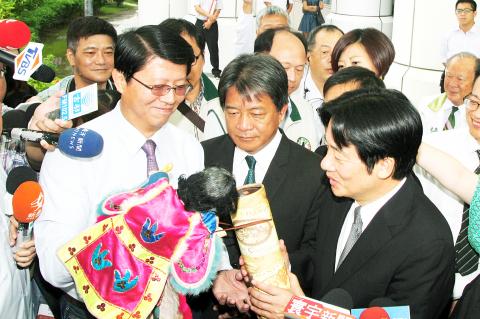Premier-designate William Lai (賴清德) yesterday promoted acting Minister of Economic Affairs Sheng Jong-chin (沈榮津) to minister and tapped National Development Council Deputy Minister Kung Ming-hsin (龔明鑫) to be Shen’s deputy.
National Security Council adviser Lin Feng-jeng is to succeed Wellington Koo (顧立雄) as the chairman of the Ill-gotten Party Assets Settlement Committee, Lai said.
Koo has been appointed chairman of the Financial Supervisory Commission.

Photo: CNA
Taiwan Institute of Economic Research (TIER) vice president Chiou Jiunn-rong (邱俊榮) is to be the next deputy minister of the National Development Council, Lai said.
“[Kung and Chiou] are young, energetic economic experts, and I believe they will be of great help to developing the economy,” Lai said.
Lai traveled from Tainan to Taipei at midday yesterday, then proceeded to consult incumbent Cabinet members via telephone from President Tsai Ing-wen’s (蔡英文) official residence.
Lai said the plan was to complete all Cabinet changes and announce them yesterday, but the consultation process took longer than expected due to prolonged discussion on policy issues.
He has yet to consult Minister of National Defense Feng Shih-kuan (馮世寬) and Minister of Foreign Affairs Minister of Foreign Affairs David Lee (李大維), Lai said.
“National defense and foreign affairs are the purview of the presidency. In addition, the two ministers are currently attending meetings overseas. As a result, they have yet to be consulted,” Lai said.
When asked whether the new Cabinet is to focus on economic development, Lai replied in the affirmative.
“The decision to appoint [Taiwan Stock Exchange chairman] Shih Jun-ji (施俊吉) as the vice premier, TIER vice president Chiou as the next National Development Council deputy minister and transferring the experienced Kung to be the deputy economic affairs minister were made to facilitate the implementation of economic policies,” he said.
A majority of Cabinet ministers will stay on, including Feng and Lee, the Executive Yuan said.
Other ministers who are to remain at their posts are: Minister of Labor Lin Mei-chu (林美珠), Environmental Protection Administration Minister Lee Ying-yuan (李應元), Minister of Transportation and Communications Hochen Tan (賀陳旦), Mainland Affairs Council Minister Katharine Chang (張小月), Overseas Community Affairs Council Minister Wu Hsin-hsing (吳新興), Minister of Education Pan Wen-chung (潘文忠), Minister of Culture Cheng Li-chiun (鄭麗君), Minister of Finance Sheu Yu-jer (許虞哲), Minister of the Interior Yeh Jiunn-rong (葉俊榮), Council of Agriculture Minister Lin Tsung-hsien (林聰賢) and Minister of Health and Welfare Chen Shih-chung (陳時中), according to the Executive Yuan.

NATIONAL SECURITY THREAT: An official said that Guan Guan’s comments had gone beyond the threshold of free speech, as she advocated for the destruction of the ROC China-born media influencer Guan Guan’s (關關) residency permit has been revoked for repeatedly posting pro-China content that threatens national security, the National Immigration Agency said yesterday. Guan Guan has said many controversial things in her videos posted to Douyin (抖音), including “the red flag will soon be painted all over Taiwan” and “Taiwan is an inseparable part of China,” while expressing hope for expedited “reunification.” The agency received multiple reports alleging that Guan Guan had advocated for armed reunification last year. After investigating, the agency last month issued a notice requiring her to appear and account for her actions. Guan Guan appeared as required,

A strong cold air mass is expected to arrive tonight, bringing a change in weather and a drop in temperature, the Central Weather Administration (CWA) said. The coldest time would be early on Thursday morning, with temperatures in some areas dipping as low as 8°C, it said. Daytime highs yesterday were 22°C to 24°C in northern and eastern Taiwan, and about 25°C to 28°C in the central and southern regions, it said. However, nighttime lows would dip to about 15°C to 16°C in central and northern Taiwan as well as the northeast, and 17°C to 19°C elsewhere, it said. Tropical Storm Nokaen, currently

PAPERS, PLEASE: The gang exploited the high value of the passports, selling them at inflated prices to Chinese buyers, who would treat them as ‘invisibility cloaks’ The Yilan District Court has handed four members of a syndicate prison terms ranging from one year and two months to two years and two months for their involvement in a scheme to purchase Taiwanese passports and resell them abroad at a massive markup. A Chinese human smuggling syndicate purchased Taiwanese passports through local criminal networks, exploiting the passports’ visa-free travel privileges to turn a profit of more than 20 times the original price, the court said. Such criminal organizations enable people to impersonate Taiwanese when entering and exiting Taiwan and other countries, undermining social order and the credibility of the nation’s

‘SALAMI-SLICING’: Beijing’s ‘gray zone’ tactics around the Pratas Islands have been slowly intensifying, with the PLA testing Taiwan’s responses and limits, an expert said The Ministry of National Defense yesterday condemned an intrusion by a Chinese drone into the airspace of the Pratas Islands (Dongsha Islands, 東沙群島) as a serious disruption of regional peace. The ministry said it detected the Chinese surveillance and reconnaissance drone entering the southwestern parts of Taiwan’s air defense identification zone early yesterday, and it approached the Pratas Islands at 5:41am. The ministry said it immediately notified the garrison stationed in the area to enhance aerial surveillance and alert levels, and the drone was detected in the islands’ territorial airspace at 5:44am, maintaining an altitude outside the effective range of air-defense weaponry. Following